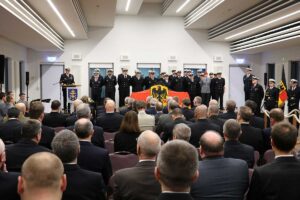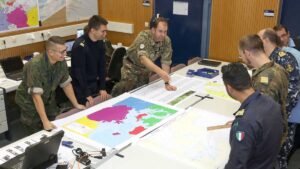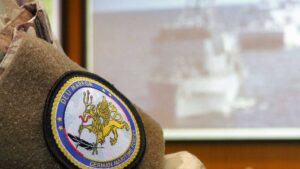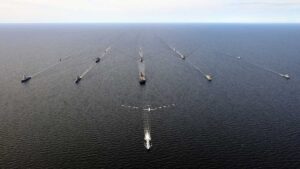It is not only since the beginning of the Ukraine war that Germany has claimed leadership in the Baltic Sea. With Deu Marfor, the navy has an important element in achieving this goal.
The announcement of a "turning point" on 27 February 2022 by Olaf Scholz in response to the Russian attack on Ukraine is of particular relevance to security policy in many respects. The main premise is clear: Germany must reorient itself in terms of security policy. The Russian campaign may not be the trigger, but it is the spark that will cause the barrel to explode.
NATO allies in particular, as well as neighbouring European countries, have long been calling on Germany to adapt its security policy to current threats. This includes adequately equipping the Bundeswehr, refocusing on national and alliance defence and complying with alliance commitments such as NATO's two-percent target. The statement by the Finance Minister following the Chancellor's announcement that Germany should have the most powerful army in Europe not only emphasises the seriousness of Germany's change of heart, but can also be seen as a clear warning to current and future aggressors.
The special fund adopted on 3 June provides the immediate financial basis for equipping the Bundeswehr to meet the new challenges. The emphasis here is on equipment and not armament. After all, the 100 billion euros is roughly the amount that is needed in addition to the already planned defence budget in order to meet NATO's two percent target in the coming years. In addition, the NATO agreement to spend 20 percent of the defence budget on armaments is also to be implemented in this way. This figure has not been reached in Germany since at least 1990.
The special fund therefore has the task of enabling the Bundeswehr to fulfil its basic tasks effectively and with suitable equipment. However, it is questionable whether it will be enough to form the most powerful army in Europe in view of rising costs and accelerating inflation. The feared stagnation of defence spending in the coming years will neither provide the Bundeswehr with planning security, nor does it seem likely to credibly deter opponents of European and international democratic values.

Even if the exact operational changes that the Bundeswehr will have to undergo in the course of time as a result of the new era still need to be defined, structural and organisational adjustments are already necessary. However, the political guidelines must also change. The required refocussing on LV/BV will not be possible without a reduction in the diverse, often maritime tasks of international crisis management.
For some years now, the Navy has been showing a willingness to place a stronger focus on national and alliance defence. The immediate deployment of the entire operational fleet to Operation Baltic Guard in the Baltic Sea at the end of February demonstrated the rapid mobilisation capability, which can also be attributed to the intensive deployments as part of the Standing NATO Maritime Groups in recent years.
Within a very short space of time, the Baltic Sea developed into one of the most important theatre of operations of the Russian war of aggression, not least due to the explosions of the Nord Stream pipelines, even if the acts of war did not directly affect the area. Regardless of this, the neighbouring states felt compelled to send a clear signal in favour of the security of the Baltic Sea and the freedom of the sea and supply routes running through it. This emphasised the significance and vulnerability of the sea more than ever.
Reaction to annexation
As a Baltic Sea neighbour, Germany and the German Navy are also facing an intensified threat situation to which they must respond appropriately. In acute terms, this primarily means adapting to NATO's regionalisation tendencies and establishing stable defence structures in domestic waters, the Baltic and North Sea, and the northern flank.
In line with this, Germany established the Deu Marfor task force in 2019, which is to be responsible for coordinating national and international operations in precisely these waters in accordance with NATO standards in Rostock and can be used by NATO as a headquarters. The establishment of the staff is in line with the development of the six existing regional NATO Maritime Commands. The establishment of the staff is intended to close a regional capability gap, as the existing commands have so far only covered the Mediterranean, the European Atlantic waters and the North Sea. The establishment of Deu Marfor was also a reaction to Russia's annexation of the Crimean Peninsula in 2014 in violation of international law.
These actions forced NATO to rethink its approach to its eastern neighbour. Consequently, the need for a competence and command centre with NATO standards in the Baltic Sea was recognised at the time in order to be able to counter imminent threats effectively and within the alliance. As the Rostock staff is planned according to NATO standards, but still represents a national command centre with multinational command capabilities, it can also be used by countries outside the alliance.
Decision postponed
However, this raises various questions: What is Germany's claim to leadership in the Baltic Sea based on? Does Germany need Deu Marfor? Does it make sense to have a single command for the Baltic Sea region? And to what extent is there a discrepancy between political will and military capabilities?
The establishment of Deu Marfor follows Germany's claim to leadership in the Baltic Sea, which has been articulated for years. With the initiation of the Baltic Commanders Conference and the NATO Centre of Excellence for Operations in Confined and Shallow Waters (COE CSW) in Kiel, this has already been practically underpinned. With the establishment of Deu Marfor as a possible cornerstone of the Baltic Maritime Coordination Function (BMCF) envisioned by NATO, Germany is going one step further.

Three naval staffs have been merged into Deu Marfor and the previous structure has been streamlined. Nevertheless, considerable financial investments have been made here without the BMCF having been awarded the contract to date. The merger and the simultaneous endeavour to achieve NATO certification have resulted in a staff structure that is integrated into the German command structure and communicates in English at the same time. On the one hand, this enables the integration of liaison officers from partner nations; on the other hand, the staff currently has to translate all orders several times. The added value of multinationality can also be questioned, as three quarters of the personnel are German and there are currently only permanent personnel from five countries on site. However, the direct connection to NATO also makes it possible to utilise all NATO information and situation pictures in the German Navy and to communicate directly with NATO. It remains to be seen whether the benefits will outweigh the high financial and administrative costs.
In addition, obstacles arise from both the geographical proximity and the overlapping areas of activity between Deu Marfor and the COE CSW. Both institutions are endeavouring to recruit the same international staff. Deu Marfor in particular is still having difficulties filling up to 25 international posts. There may be several reasons for this: Smaller NATO navies simply lack the personnel to fill all possible NATO duty stations. But military policy reasons also play a role.
Germany's ambitions are certainly laudable, but also represent a double-edged sword for NATO. Alongside Germany, Poland has also expressed an interest in taking over the BMCF. The decision on this issue, which was originally announced for 2021, has so far been postponed. A vote in favour of Germany and thus against Poland at this point in time could, it is feared, further strain the relationship between the two countries in the long term and have a negative impact on the internal unity of the alliance.
To avoid this dispute, NATO could also decide in favour of a third, non-participating nation. However, no country has yet expressed an interest and, given the great importance of Germany and Poland for NATO, it is unlikely that both countries will be snubbed. It will therefore be decisive whether Poland can be integrated into Deu Marfor in such a way that it can give up its ambitions for the BMCF in favour of Germany while saving face. As long as there are no signs of a solution to this issue, a decision on the BMCF by NATO cannot be expected.
Finally, the question remains as to how Deu Marfor can be used in peacetime. Use as an international command post by other institutions is probably only an option for the EU, but the EU is still holding back in the LV/BV area, especially as almost all Baltic Sea states are NATO members and duplication should be avoided. Due to the regional focus on the Baltic Sea, other international applications are almost impossible.
The use of Deu Marfor for NATO's northern flank, especially the North Sea, is possible but unlikely, as the contract is awarded specifically for the Baltic Sea. However, if an extension to the northern flank were to be sought, this would further complicate the political situation, as the interests of not only the Baltic Sea states but also those of the countries bordering the North Sea would then have to be harmonised.
Alternative use
In addition to its benefits for the Alliance, Deu Marfor can provide a platform for the operational realisation of Germany's new security policy ambitions in the maritime space. The competence and command centre enables the coordination of national and multinational operations in the Baltic Sea. Equipped with the right competences and backed by political will, it offers the opportunity to take over the maritime tasks of the LV/BV. If Deu Marfor is not to be a pure NATO staff, it should be equipped with the necessary capabilities to take on a coordination task in the Baltic Sea region within a national framework.
Furthermore, Germany must not ignore the North Sea or the northern flank. Even if Deu Marfor is to be deployed primarily in the Baltic Sea region at NATO level, it should at least be critically scrutinised at national level whether the staff should not also be responsible for the North Sea and North Flank regions. In combination with a refocusing on LV/BV tasks, the German Navy could use existing coordination capabilities certified at NATO level to increase its presence in these waters, conduct (multi-)national exercises and expand capabilities for the defence of national and alliance waters.

Even if the German Navy is faced with the difficult task of providing LV/BV with too few units, carrying out international crisis management missions and conducting international maritime diplomacy, the establishment of Deu Marfor must not mean turning away from international ambitions. It is true that the importance of LV/BV has become clear since the Russian invasion of Ukraine at the latest. However, as one of the world's leading economic powers, Germany is dependent on international stability and the associated free sea lanes.
This means that global engagement, such as the Indo-Pacific Deployment, cannot and must not be neglected. Effective utilisation of Deu Marfor in the sense of improved integration of multinational units could free up capacities for the German Navy, which it urgently needs for international engagement, without neglecting national waters. Similar to the coordination of German and Dutch amphibious forces, Deu Marfor could achieve a more effective division of tasks in the Baltic Sea. This would make it possible to close capability gaps in the predominantly small Baltic Sea navies and at the same time relieve the German Navy.

Alongside the establishment of the Baltic Commanders Conference, Deu Marfor is a further step by Germany towards a more active leadership role in the Baltic Sea. As the largest allied navy in this area, this is exactly the right signal to our allies.
The aim now is to achieve NATO certification as soon as possible and establish Deu Marfor as the leading cooperation centre for the Baltic Sea and the northern flank. Whether this can be achieved successfully also depends to a large extent on the successful integration of Poland, which would also like to take over the Baltic Maritime Coordination Function but, unlike Germany with Deu Marfor, has not yet institutionalised it. Equipped with the right political and military competences, Deu Marfor can then develop into a valuable player in German and European maritime security within and outside NATO.
Anne Runhaar studies International Politics and International Law at the Christian-Albrechts-University of Kiel and works as a research assistant at the Institute for Security Policy (ISPK). Henrik Schilling is a research assistant in the Department for Maritime Strategy & Security at the ISPK.
Anne Runhaar and Henrik Schilling







